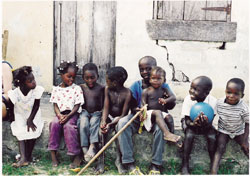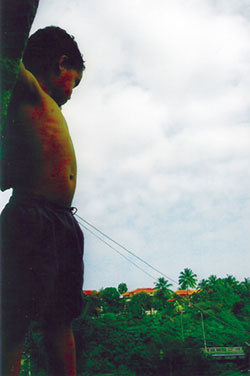A profiteering mentality
It will take more than good will to bring about change for the peoples in the Dominican Republic and other nations of the global South
By Dean Riley
September 2005
Return to Table of Contents
Print Article
The National Human Development Report of the Dominican Republic (2005) was recently released by the United Nations Development Program. The report states that poverty and underdevelopment in the Dominican Republic (DR) cannot simply be attributed to a lack of resources. The nation has consistently shown the highest average rate of economic growth throughout Latin America and the Caribbean over the past 50 years. Two decades ago the economy of the DR rested upon sugar cane and the production of sugar for export. However, tourism has become the country's most important commodity today.

Children of the bateys, impoverished communities of Haitian sugar cane workers living in the Dominican Republic.
According to the UN report, poverty and underdevelopment are rather a direct result of a "profiteering mentality": the constant and excessive plundering on the part of the political, economic and social elite compounded by their lack of concern towards the impoverished majority. Resources have been overexploited so excessively that they are now dangerously unsustainable.
The problem is intensified by the fact that the Dominican legal system is largely controlled by political parties and business groups. The poor are strictly penalized for their petty crimes, while the wealthy are seldom brought to justice after stealing millions.
The social and historical milieus in which these problems have been created are not new. Their roots can be traced back to the time when the Spanish first arrived on the continent. The "Encomienda" system gave the Conquistador absolute control over Indigenous populations and natural resources throughout Latin America. The system assured that the Indigenous (and subsequent slaves from Africa) were strictly controlled and utilized as cheap labour and that those in positions of power – from the guardia campestre (camp guards) all the way up the colonial line of command – were able to secure their share of the goods harvested in the "New World".
While the Spanish Crown and early missionaries eventually worked to suppress this colonial model, remnants of it still persist today and continue to perpetuate poverty, slave-like labour, social injustice and underdevelopment in countries like the DR.

A child from the barrio (poor neighbourhood) looks across the divide to the homes of the wealthy. Dominican Republic. (Photo credit: Jean-Paul Cloutier)
How we benefit
In what ways do people of the "first world" benefit from the remnants of the Encomienda system in the "third world"?
Beach resorts in the DR provide luxurious spots for Canadians and other foreign vacationers to rest and play, while those cleaning our rooms and cooking our meals work long hours and are paid wages that are insufficient to support themselves and their families. Furthermore, resort workers could never hope to enjoy the clean, pristine beaches that are reserved for tourists alone.
Free Trade Zones are abundant in the DR, giving foreign companies tax-free status in order to import textiles, manufacture items cheaply and export consumer products. On Canadian store shelves we can find clothing, foot wear, jewellery, electronic components and much more that have been sewn, assembled or built by Dominican hands. Low wages and lenient employee protection laws make the Free Trade Zones ideal places for foreign companies looking to maximize profit.
Sugar (among other export crops) is being harvested mostly by Haitian labour in the DR. Living in abhorrent conditions and paid slave wages, they are in the country illegally. However, as long as the Haitians stay on the bateyes (small impoverished communities located on the plantations), they are left alone. The minute they look for more lucrative work off the batey – taking a job with lower wages than the employer would have to pay a Dominican national – forced repatriation and separation from family becomes a real threat.
A profound shift
The Human Development Report identifies that a radical and profound shift in the structure of Dominican society is required in order to address these and other problems. The shift must be towards intensive social participation and empowerment of all people. It will only be by changing the foundations on which Dominican society has sustained itself until now that human development will be promoted – a development that guarantees well-managed and participative inclusion of all citizens.
The struggle against destitution, though urgent and necessary, is not enough. It is a question, rather, of building a world where every man, no matter what his race, religion or nationality, can live a fully human life, freed from servitude imposed on him by other men or by natural forces over which he has not sufficient control; a world where freedom is not an empty word and where the poor man Lazarus can sit down at the same table with the rich man.
Populorum Progressio (On the Development of Peoples) Encyclical Letter of Pope Paul VI, 1967
What the report fails to identify is our role-those of us lucky enough to have been born in the "first world" – in addressing the problems afflicting those people in the global South. The problems in the DR do not exist in a vacuum. Profound poverty for the majority of the world's population exists in order to create obscene wealth for the tiny minority who are the owners and movers of capital in the game of globalization.
Teresa Hayter in her book "Creation of World Poverty" (Pluto Press, 1981) writes that the world is divided into two not-so-equal parts. This division is depicted as a large circle with a smaller circle at its centre. The wealthy nations are represented by the small circle in the centre – while the poor nations are represented by the larger circle on the periphery.
...Whatever insults human dignity, such as subhuman living conditions, arbitrary imprisonment, deportation, slavery, prostitution, the selling of women and children; as well as disgraceful working conditions, where men are treated as mere tools for profit, rather than as free and responsible persons; all these things and others of their like are infamies indeed. They poison human society, but they do more harm to those who practice them than those who suffer from the injury.
Gaudium et Spes (Pastoral Constitution on the Church in the Modern World) Second Vatican Council, 1965
Wealthy nations at the centre gain wealth and maintain their power by pulling resources from the poor nations on the periphery: clothing from Free Trade Zones; inexpensive sugar, coffee and fruit cultivated and harvested by the hands of the poor; private resort beaches for our use alone. All of these are resources that we take from the periphery; all of this helps to reinforce age-old problems that create and perpetuate poverty in countries like the DR.
According to the United Nations Human Development Report, Dominican society must shift towards an intensive social participation and empowerment of all people. However, this will require more than goodwill on the part of Dominican society. Until we in the first world begin to address our dependency on the resources pulled thoughtlessly from the poor periphery, any attempt at promoting change will be unsuccessful. This profound shift requires the conversion of us all as we work together towards the greater unfolding of the Kingdom of God.
Dean Riley is a former Scarboro lay missioner.
What you can do
- Come to the developing world-not as a tourist or as one who has all the answers, but rather as someone who genuinely wants to see the world from the perspective of the poor; as someone who desires to be in relationship and in solidarity with the people we encounter.
- Begin to educate yourself about the realities of poverty – how it is created and how it is sustained; about the role we play as consumers in the game of globalization.
- Seek out accurate information from trustworthy organizations such as Scarboro Missions; the Canadian Catholic Organization for DEVELOPMENT AND PEACE; Project Ploughshares; KAIROS, and others.
- After seeing the world from the perspective of the poor and educating ourselves about the realities of poverty, we are finally able to identify for ourselves what we can do to make a difference. The possibilities are endless and options will be generated by the organizations we have looked to for accurate information. Make a commitment and do your part however small or large. Remember that God does not choose the equipped, but rather equips those who are chosen.
- Be ready to share your story at every opportunity, for you do not light a candle to hide it under a bushel. By sharing our stories, our experiences, what we have learned and what we are doing to help transform the world, we have a profound effect on those around us. You are salt for the earth. You are light for the world.
- And ultimately "act justly, love tenderly, and walk humbly." If everything we do is from this perspective, we cannot help but participate in the unfolding of the Kingdom of God in our suffering world.
(Prepared by Dean Riley)
Seeing the world from the perspective of the poor
The Dominican Republic Exposure Program welcomes Canadian high school and parish groups for a week-long experience among the Dominican people. Through billeting, participants experience the language and culture of their Dominican hosts. The program is coordinated by former Scarboro lay missionary Dean Riley, assisted by a team of Dominican young adults from the sugar mill town of Consuelo.
For more information, contact Dean Riley by e-mail at dariley@web.ca
Make Poverty History
In 2005, campaigns to end poverty have been launched worldwide. In Canada, Scarboro Missions has signed on to Making Poverty History. We fully endorse the platform and see it as consistent with the priorities of our mission community. The campaign calls for:
- more and better foreign aid: Canada must do more than simply maintain or even increase aid – we must also make aid more effective;
- trade justice: Canada must press for trade and investment rules that ensure governments and their citizens can choose the best solutions to end poverty and protect the environment;
- cancelling of the debt burden: Canada must promote the immediate and unconditional cancellation of 100% of the multilateral and bilateral debt owed by the poorest countries;
- an end to child poverty in Canada: We must make key investments in social development that will make a difference.
At the start of the 21st century, 1.2 billion people live in abject poverty. More than 800 million people go to bed hungry and 50,000 people die every day from poverty-related causes. Poverty exists because of the choices we make.
Please pray and work for change. For more information and to sign on to this campaign, go to www.makepovertyhistory.ca
Return to Table of Contents
Print Article